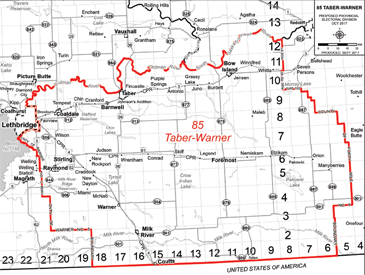Current Temperature
Democracy goes past just voting
Posted on March 27, 2019 by Taber Times MAPPING EXPEDITION: Taber's new riding drops Cardston and adds Coaldale. TIMES GRAPHIC
MAPPING EXPEDITION: Taber's new riding drops Cardston and adds Coaldale. TIMES GRAPHICApril 16 is the day we’ve all been waiting for – some more than others.
But it is the day that Albertans will vote to form the next Alberta government, not the next federal government, not to stick it to anyone else, or send a message to perceived friends or enemies around the world.
There’s no denying that the stakes in the upcoming vote are large.
Conservatives have sought a return to power for four years. The New Democrats are looking to hold on to power.
A host of other parties are looking to have their positions in front of voters while major parties offer substantially different paths on how to move Alberta onward.
But it’s not just the Alberta political landscape that’s increasingly polarized and garbled.
In all corners, hardline views seem to be the order of the day.
Lots of criticism and not much of it constructive.
It’s hard to find a political conversation that doesn’t compare UCP Leader Jason Kenney’s tax plan to Donald Trump’s, or pronounce that New Democrat Leader Rachel Notley is taking us down a similar path of Venezuela.
To counteract this in years gone by, politicians would solicit voters to consider the “kitchen table” conversation as a way to focus issues on the personal.
In today’s social media environment, where the very structure of the technology leads to our own views being amplified back to us ad nausea, a broader but locally focused conversation is needed.
It’s not just the kitchen table discussion that needs to take place. It’s conversations across back fences, at the playground and the water cooler at work.
Certainly, such a decision shouldn’t be made without a broader context, but let’s focus the question to get the relevant answers.
Therefore, the question should be: what have the Alberta New Democrats done to our utility sector, not what did the Ontario Liberals do to theirs?
What does immigration do for our province, not what’s happening on the U.S.-Mexico border?
Similarly, what will a corporate tax cut – headlined as a way to keep pace with dropping U.S. rates – do for our economy, which is quite different than Texas, North Dakota or Saskatchewan for that matter.
As well, a price on carbon is increasing predominance globally, but our largest international trading partner won’t have one any time soon. How can that cost not affect our trade competitiveness?
Speak to your neighbours, even those you may disagree with, and you’ll find out who’s been helped or hurt by changes to labour standards, higher minimum wage, a downturn in oilpatch activity, or capital projects in this province.
At its heart, it’s a day for citizens of this province to evaluate our current situation and provide their say about what sort of province this should be, and what we should do to get there.
Local or provincial action is certainly a response to factors outside the province, and perhaps a way to effect change at higher levels of government.
Alberta’s premier effects an important stance in Confederation. Our ministry of trade develops strategies to capitalize on trends on the world markets. Our industries must vie for skilled labour and capital in a global marketplace. Our citizens must also be able to compete against the world.
Few would disagree.
But it’s lazy to distract from the present-day questions with a bird’s nest of complaints from around the world or glancing examples meant to prove a point.
Albertans will get their chance to send whatever message they please to Ottawa sometime in the fall when the next federal election is scheduled.
We need to get our own government’s message set first.
Leave a Reply
You must be logged in to post a comment.



